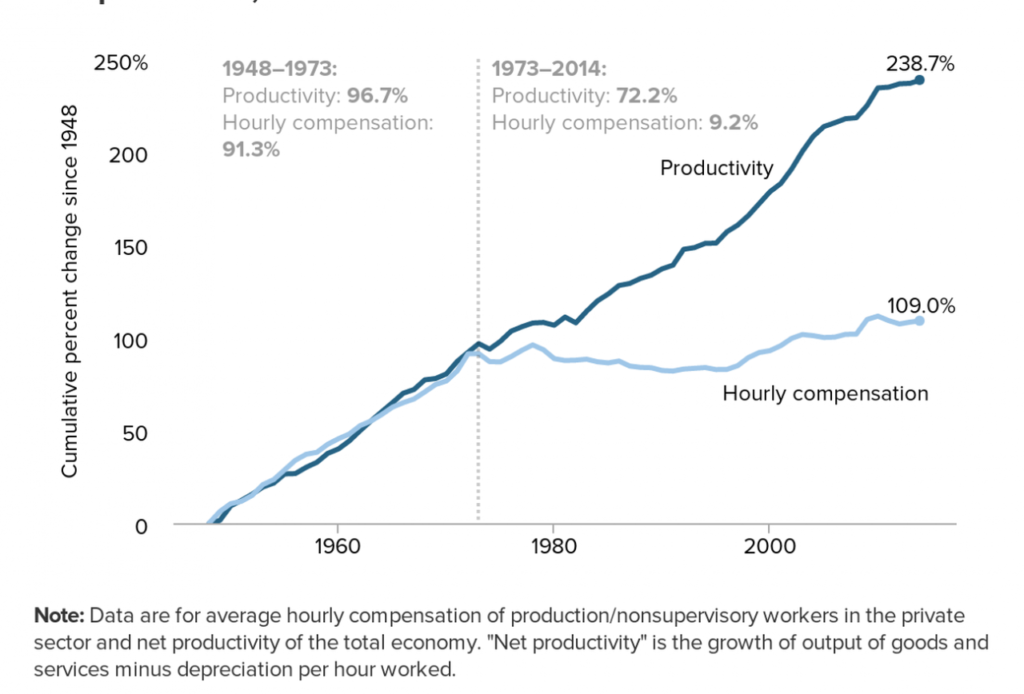
Politicians like to brag about the low levels of unemployment they claim to have achieved. A low level of unemployment is presented as evidence that the economy is being managed well, and therefore that the stewards don’t need to be changed. But as this essay will demonstrate, low unemployment is meaningless if the jobs don’t lift people out of poverty.
Western politicians have been terrified of unemployment ever since World War II. Adolf Hitler frequently made reference in his rally speeches to the climbing German unemployment rate, citing it as evidence of the failure of the then-existing political Establishment. It’s taken as true by all that an unemployed man is far more likely to cause trouble.
The postwar paradigm has been characterised by a concerted effort to keep unemployment low. This worked out very well in the decades after the war, because back then a job guaranteed a certain standard of living. A full-time worker could expect to own a house and support a wife and three children. This great wealth, fairly distributed, kept revolutionary sentiments to a minimum.
Since the advent of neoliberalism in the early 1980s, the Western worker has solidly lost ground. Wages are no longer coupled with productivity (see graph at top of page), and so the buying power of the average wage has steadily declined. The average wage in New Zealand now has less than 40% of the house-buying power that it had a generation ago.
The problem is that Western politicians have continued with the assumption that so long as they keep unemployment low, all will be swell. This is a fine assumption when the average worker can afford a house and to raise three children in it. When they can’t, this assumption just leads to the face of the average worker getting pushed further and further into the shit.
If a person works full-time, but can’t meet a dignified standard of living with the proceeds from their wage, then that person is effectively a slave. Whether you’re a slave or free is not a question of how big your television is, it’s a question of how much coercion you live under. If your wage is so poor that you can’t live on it, then you’re effectively dependent on other people’s largesse. Less dependent than a beggar, but dependent all the same.
The lesson that Western politicians need to learn is that unemployment itself is not a good thing. Unemployment only has value insofar as it is conducive to ending the people’s suffering. If a working person can’t alleviate any of their suffering because their wage is so poor, then they are just as liable to become discontented as an unemployed person.
After all, the unemployment rate on slave plantations is extremely low. No-one on a slave plantation is sitting idle, or on the dole. So if unemployment alone is a factor important enough to gloat about, then it could be argued that the slave plantation model is a highly effective way to organise an economy. The absurdity of this is obvious.
It’s meaningless, then, for a politician to gloat about the low unemployment levels of their economy, as if that alone were evidence that they were running the country well. What matters is that the people are not suffering – if a large proportion of employed workers are not able to live decent lives, then the country is not run well.
The starkest problem for the Western worker is that they no longer have any negotiating power. This is the result of a combination of factors, the foremost being union-busting laws, ever-increasing technological sophistication (requiring ever-higher educations to understand) and the mass immigration of cheap labour. The capital holders have all the power, and they have used this to drive wages to the floor.
There probably isn’t any way to solve this problem within the current economic paradigm. The decoupling of wages from productivity has granted to capital holders a degree of coercion over their workers that they have not enjoyed since slavery: stories like this are now common. The only solution that seems likely is to institute a universal basic income, because this would allow workers to turn down abusive or exploitative employers.
*
If you enjoyed reading this essay, you can get a compilation of the Best VJMP Essays and Articles of 2019 from Amazon for Kindle or Amazon for CreateSpace (for international readers), or TradeMe (for Kiwis). A compilation of the Best VJMP Essays and Articles of 2018 and the Best VJMP Essays and Articles of 2017 are also available.
*
If you would like to support our work in other ways, please consider subscribing to our SubscribeStar fund. Even better, buy any one of our books!
